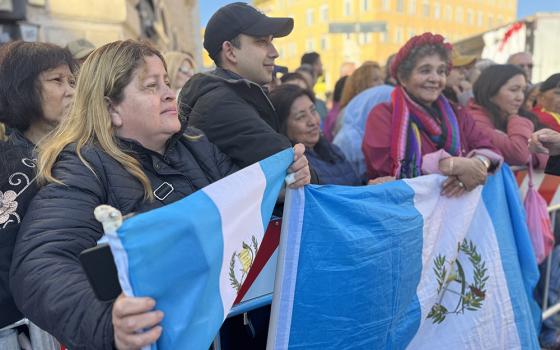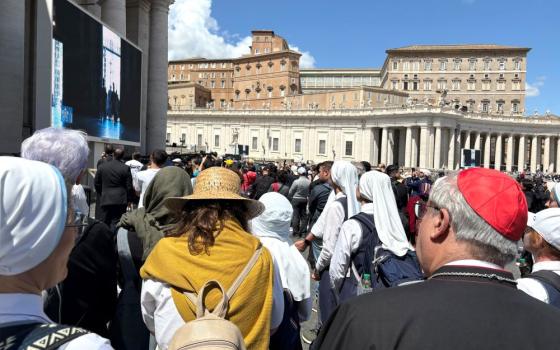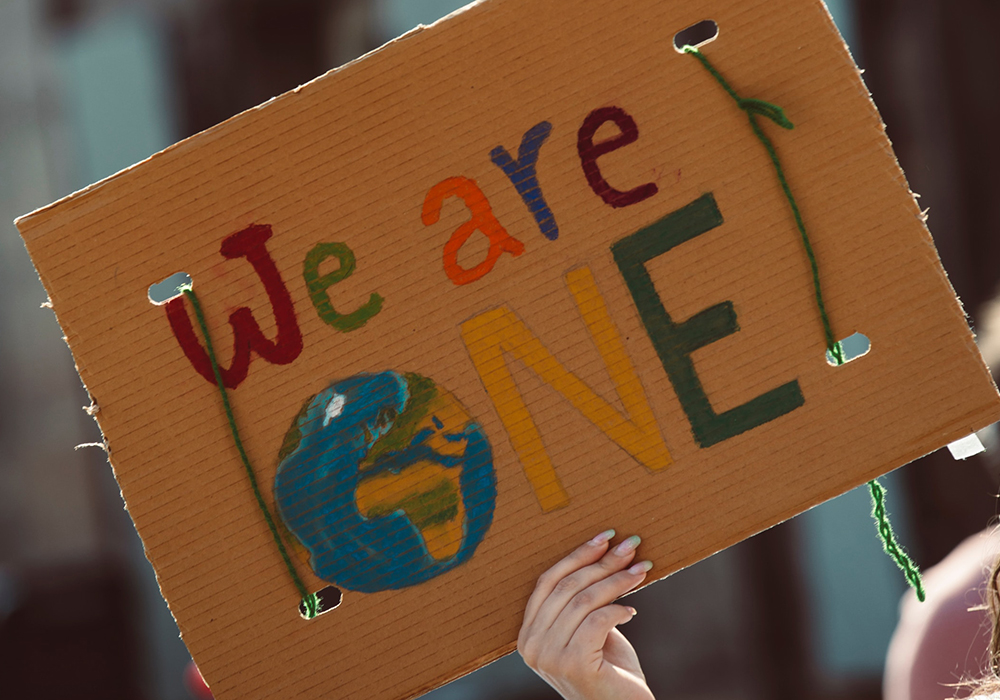
(Unsplash/Markus Spiske)
In the midst of the challenges our world is facing today, we asked our panelists a simple but profound question:
Is it possible to have a world where peace exists everywhere? And if so, what would it take to make it happen?
Responses have been edited for clarity.
______
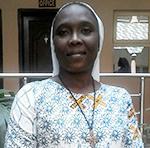
Edith Eneh is a member of the Sisters of Notre Dame de Namur, Province of Nigeria. Since her profession in 2011, she has worked as a bursar in various schools for eight years. Currently, she works in her province's development office.
Who are the bearers of this peace? We are called to be witnesses to this peace and carriers to the utmost ends of the earth. We are the "favored," and this refreshing, renewing and transforming peace rests on us to transmit to the rest of the world.
What are these great acts of love that bring peace upon our earth, and what would they look like? Our acts of kindness and love should have no boundaries but should transcend geographical and ethnic boundaries. The Sisters of Notre Dame de Namur, Province of Nigeria, in line with their mission of standing with the poor, feed the poor quarterly, regardless of religion or nationality. They provide raw foodstuffs and clothing to the poor, including Christians and Muslims alike, who are made poor due to the insensitive human actions of bandits and terror groups.
Perhaps it was Nobel Peace Prize winner Mother Teresa of Kolkata who summed it up best through one of her favorite sayings, when she reminded her own admirers that real peace on earth does not come from doing great things, but rather from doing little things with great love.
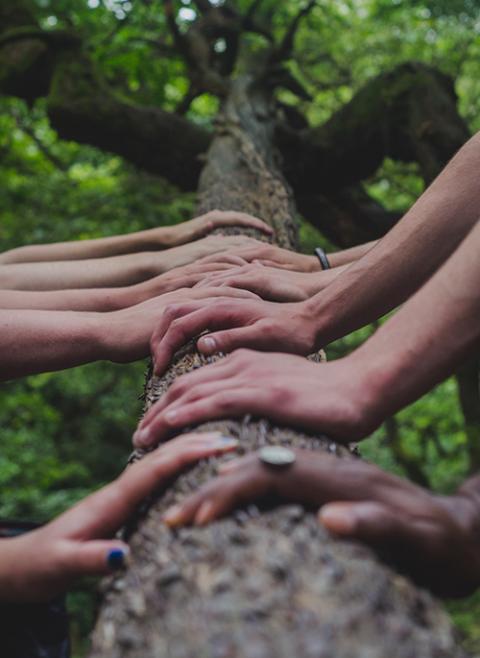
(Unsplash/Shane Rounce)
What does it take for peace to exist in every land? For peace to exist in every land, people should learn to make peacemaking an initial part of formation. This leads to the achievement of inner peace. This divine light of peacemaking comes from one's fundamental life orientation. A child brought up in a peaceful environment, and thought to live peace as a value will always uphold peace wherever he finds himself. The peacemaker's acts of love are ordinarily more than regular acts of human kindness. They reflect a kind of divine light that illuminates the dark spots of our chaotic world.
Peace requires acceptance of every human being as one, irrespective of religion, ethnic group, race or color. People will have to learn to accommodate and accept one another. The differences in the color of the skin and eyes, the color and texture of the hair, and the differences in the religion and geographical location of people do not make anyone less human.
Respect for other peoples' cultural and religious beliefs should be fundamental in peace building. This also promotes international relations and strengthens diplomatic ties.
May our voices join with those of the angels always: "Glory to God in the highest and on earth peace to those on whom his favor rests!" Peace be with you!
Advertisement

Begoña Costillo is a member of the Order of St. Augustine and lives in the Monastery of the Incarnation in Lima, Peru. She entered religious life in 2012; since then, she has lived in Spain, Italy and Peru.
Peru is experiencing peace this Christmas. Just a year ago, the streets all over the country erupted in shouts and blows; roads were blocked by protesters, and the army took up arms. Thousands of Peruvians rebelled against the precarious situation of the country and a fragile, corrupt government that turned a deaf ear to the demands of its citizens. More than 60 people died during the revolution and the fierce state repression that stopped it. These clashes made evident the immense gap that exists between the Peruvians of the interior and those of the capital, between the poor and the rich, between the government and the people.
Now, it all seems to have been forgotten. Now that the voices of those who protest are not heard, and we hardly remember the names of those who died. Peace, the apparent peace, came as a result of wear and tear and tiredness. It was necessary to return to work, to till the fields, to gather the fruits, to sow again. One cannot live off the revolution because no one pays the one who complains. However, this peace is not true peace because within it still burns the embers of injustice and division that, sooner or later, will ignite the flames of a new conflict.
A peace that forgets the wounded and hides the offenses, that rises on the victory of some and the defeat of others, is impossible. It is impossible because it stealthily incubates the unrest that gives rise to wars. History has shown this countless times.
In the same way, history also shows us that the only possible peace, in Peru and in the rest of the world, is true peace: the peace that is built on real justice, in which the rights of all are recognized, the absolute dignity of each person; the peace that unveils and restores the wounds of history; the peace that seeks to unite all those who are different into one universal fraternity.
For this reason, the road to peace is slow and arduous, for it requires each person to sacrifice his or her selfishness in favor of a Goodness that extends to all. This Goodness is the hidden seed of peace which initially takes root in the human heart and, from there, fosters the creation of peaceful societies, policies and economies. It is a Goodness that seeks us and offers itself to us today in a child who is God made small. He is the true embodiment of peaceful love, who gives freely without pursuing self-interest, does not take account of evil; heals the sick and gives bread to the hungry; does not judge but saves. He is a resilient God, eternally a father, the only possible peace.

Children come to adore the baby Jesus at the Christmas gathering at the Monastery of the Incarnation in Lima, Peru. (Laura Miyagui)

Hna. Ruth Karina Ubilus, Hermanas Educadoras de Notre Dame. (Foto: GSR)
Ruth Karina Ubillus, a member of the Congregation of the School Sisters of Notre Dame, was born in Peru. With 12 years of teaching experience in public schools, she joined the congregation in 2006 after her novitiate in Brazil, where her missionary calling began. During her journey, she discovered the significance of "inner child" work in Guatemala, emphasizing its crucial role in personal growth and development. She holds a diploma in spiritual direction. She previously lived in Brazil for four years and since 2020 has lived in South Sudan, where she is driven to help individuals in their journey of personal growth and development.
Today a savior has been born to us. Peace is a gift we receive today and every day in the close and loving encounter that we experience before God. The divine essence of the child God is peace. Jesus was born to show us the way to find the peace we have lost by separating ourselves from God. We have lost our peace because we have distanced ourselves so far from God that we cannot find our way back. I do believe that peace is possible, starting with ourselves turning day by day to God. Do we feel that peace of God? Is it reflected in our being? Is the peace of God evident in the relationships of love, justice, forgiveness and solidarity that we show others? How much peace do others receive when they approach our lives? Are we motivated to join in the struggle to build this world of peace?
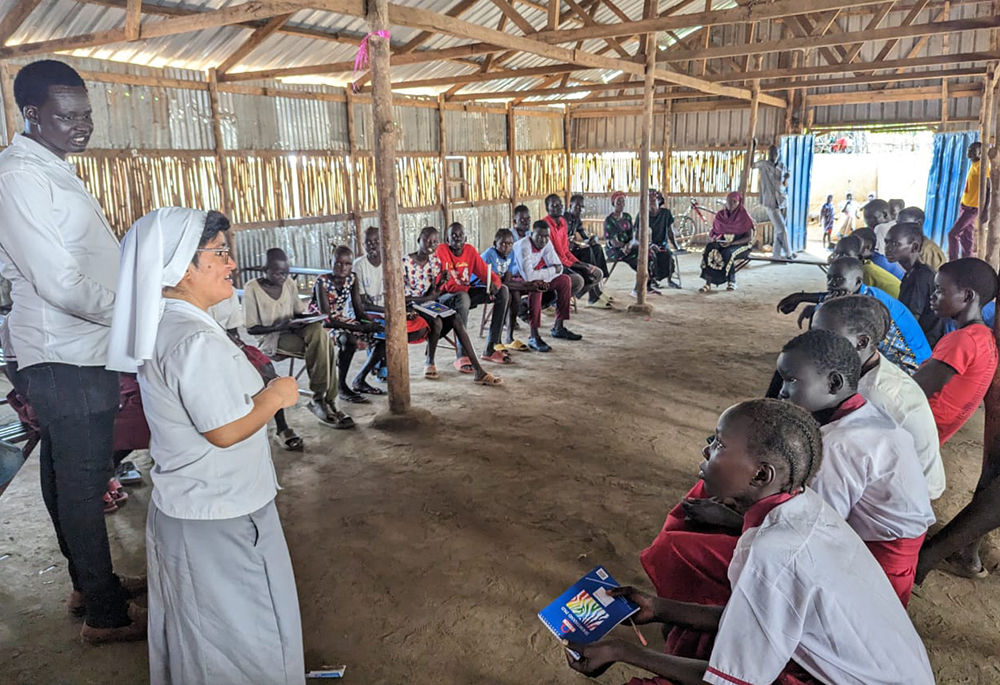
Ruth Karina Ubillus, a member of the Congregation of the School Sisters of Notre Dame, gives a workshop on trauma healing and reconciliation at a camp for internally displaced people in South Sudan. (Courtesy of Ruth Karina Ubillus)
There is much pain and suffering, much violence and division. Here in South Sudan, they have lived through many years of war. Where is the root of so much conflict? Tribalism. Each human group defends its own, claims power, or abuses the most fragile group. From our missionary experience, we teach them that as children of God, we cannot set borders. There are no tribes in Christ's church because Christ is universal. We raise awareness to the fact that the way to move forward and grow as a country is through reconciliation and the search for justice for all.
We have conducted workshops on nonviolence and peace building, as well as workshops on trauma healing. It is liberating to see how people recognize the pain they carry and see the need for forgiveness towards those who have hurt them. Peace is precisely freeing oneself from hatred, inner resentment, and taking the step of freedom that comes from love. It is necessary to become aware of the deep root of all violence in the human heart and to make efforts for dialogue, and reconciliation that leads to the unity of a country, families and of society in general.

Charity Bbalo, a Religious Sister of the Holy Spirit from Zambia, serves as the research and capacity development coordinator at the Centre for Research in Religious Life and Apostolate, or CERRA. She obtained a bachelor of arts in education (English and religious studies) from the University of Zambia and a master's degree in multicultural and international education from Oslo University College, Norway. She has served as a senior lecturer in a teacher training college and now serves as deputy principal in a girls' high school. She is passionate about researching issues related to religious life, women and the girl-child. She enjoys reading novels and academic articles and writing.
When I was in primary school and preparing for national examinations that would usher us into secondary school, our head teacher always used to tell us to "die a little" in order to live the future we envisioned. As I recalled this advice, I felt that it could easily be adopted if we all hoped to see a world where "swords are beaten into plowshares and spears into pruning hooks" (Isaiah 2:4). The world today is plagued by political and religious strife, economic inequality, and other such situations which fuel conflict among and within nations, ethnicities and religious groupings.
According to the The Washington Post of June, 29th, 2023, over 238,000 people died in global conflict in 2022. This was among the highest in recent years. Conflicts and wars have continued to be recorded, with the latest being in the Holy Land. By the end of November 2023, over 14,000 people had been killed. With such a bleak reality, is it possible to conceive a world where peace reigns? The answer is yes. Scripture reminds us that the birth of Christ, the Prince of Peace, brings hope for a better world. Like the angels announcing his birth, we too can sing "Glory to God in the highest and on earth peace to those on whom his favor rests" (Luke 2:14).
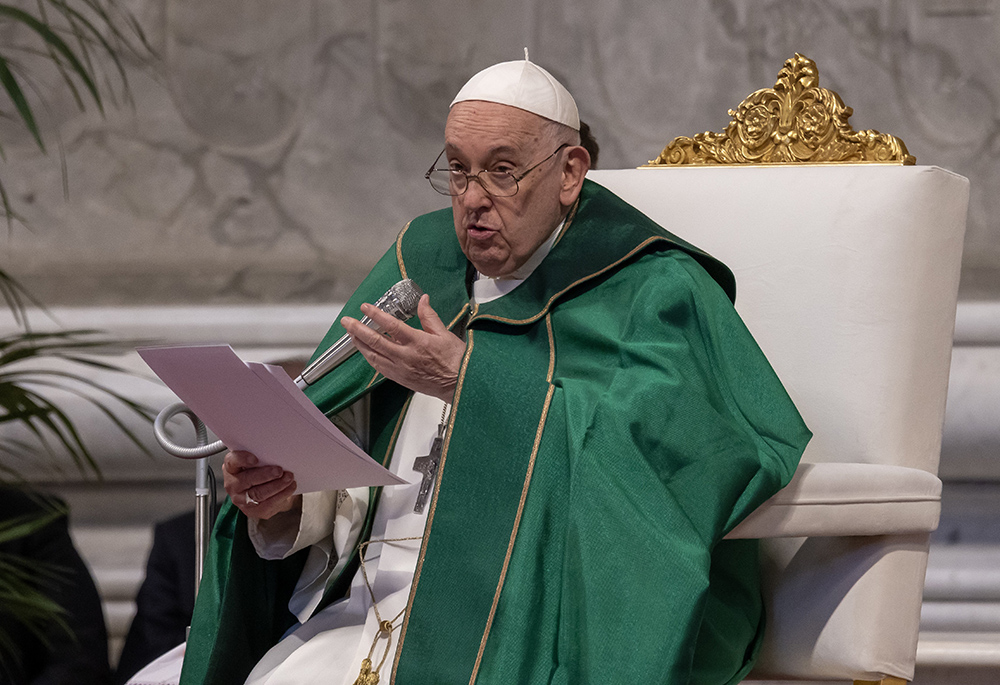
Pope Francis gives his homily during Mass for the World Day of the Poor in St. Peter's Basilica Nov. 19, 2023, at the Vatican. (CNS/Pablo Esparza)
A world where resources are equitably shared is one way of minimizing conflict. This can be done by stretching out of our comfort zones and practicing our faith in an active manner, something akin to what Ignatian spirituality refers to as "faith that does justice." Individuals and nations that have excess resources can share with the less privileged as an authentic show of kinship. Pope Francis noted, "We can multiply all that we have received, making life an offering of love for others."
Another step towards the achievement of peace in every land is by destroying the structural and religious divides that separate us, and coming to a realization that we all need each other. As the philosophy of ubuntu states, "I am because we are." All people, no matter their race, religion and status have something valuable to offer to humanity. Embracing diverse perspectives can replace tension with the value of coexistence.
Instructing the young is another important step towards world peace. When families, schools and religions emphasize peace, tolerance and forgiveness in word and deed, children will grow up to appreciate and practice the said virtues. Media houses can also participate in peace building by highlighting stories about forgiveness, respect and friendship.
Promotion of peace is everyone's responsibility. It requires "dying a little" for the common good. While it is certainly not an easy undertaking, our little collective efforts can make it possible.

(Unsplash/Jordan Wozniak)

Pouiwindin Chantal Ouedraogo, a Dominican Sister of the Presentation, is from Burkina Faso. She holds a bachelor's degree in philosophy and letters and a teaching certificate. She has 10 years' experience teaching in primary schools, the majority spent teaching in Burkina Faso. In 2022, she was missioned to Cameroon, and for the past year, she has taught primary school in Mokolo, in the far north region of Cameroon. She also has been involved in pastoral activities that support young people.
Advent is generally associated in the Scripture with the question of peace, described as a characteristic of the kingdom that Christ inaugurates among men. Christmas festivities resonate with the words: "Glory to God in the highest and on earth peace to those on whom his favor rests" (Luke 2:14). The yearning for peace is clearly expressed in this refrain of the angels. But how do we achieve it? What are the conditions for building communities of peace in our nations?
In light of our current reality, a world where peace reigns among peoples and nations seems like a utopian dream. However, our faith in the Prince of Peace makes us affirm that peace is indeed possible. We believe that building peaceful communities without God is not possible. In fact, no human group can walk and live without transcendence. Humanity is deceptive and cannot guarantee interpersonal or human relationships; we also need a relationship with God. The peace process that does not consider the world and people as belonging to God leads to nothing. The great risk of current efforts to build peaceful and cohesive societies is this cynicism which detaches man from his foundation, from his Creator. This belief is supported by the Christian biblical understanding of peace. Peace is not the fruit of human efforts alone; it is a gift from God.
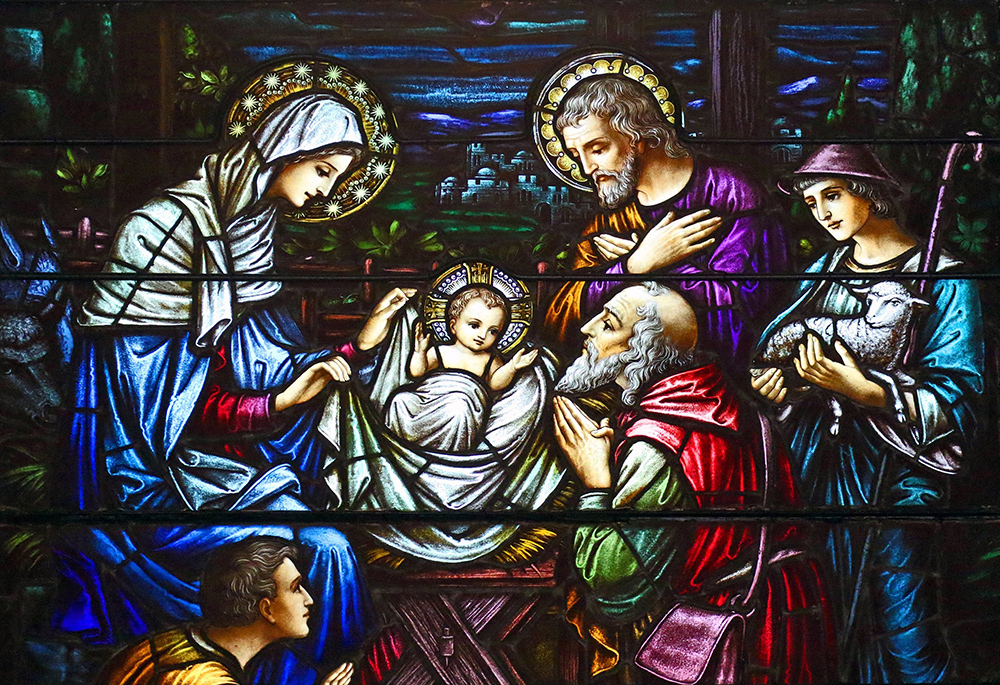
This stained glass window at St. Aloysius Church in Great Neck, New York, depicts Jesus in a manger, surrounded by Mary, Joseph and three shepherds. The feast of the Nativity of the Lord is celebrated Dec. 25. (OSV News/Gregory A. Shemitz)
The Nativity, at the heart of which we contemplate the mystery of the Incarnation, also opens us to the mystery of peace. The entry of God onto the scene in the Old Testament sufficiently illustrates that there is no happiness and peace that does not come from God. God calls us to peace and leads us there through his Son. As Pope Paul VI aptly said, "Peace is not simply the absence of warfare, based on a precarious balance of power; it is fashioned by efforts directed day after day toward the establishment of the ordered universe willed by God, with a more perfect form of justice among men."
In order to build peaceful states, a certain number of guiding principles, whose application can constitute an authentic path towards peace, must be considered:
- Be convinced that unity prevails over conflict;
- Work together for the common good rather than for personal interests;
- Collaborate in building a more peaceful and just society;
- Make our differences an asset and not a source of conflict;
- Dare to cross borders in openness to others;
- Engage and continue dialogue, which may seem humiliating at certain times.
Let us open our hearts to welcome the Emmanuel, who comes to give us his peace, not in the way of the world. Our prayer this Advent season is that the peace of God may reign in our hearts.





